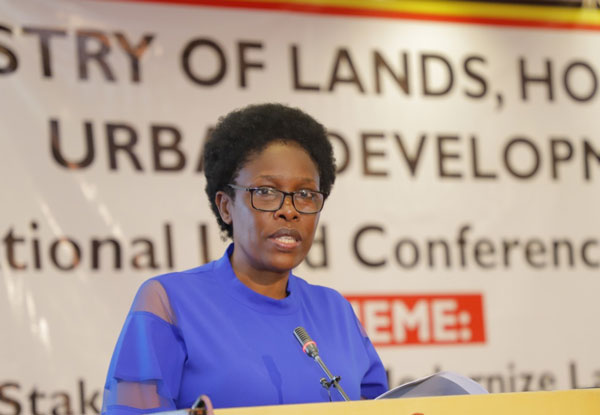
Kampala, Uganda | THE INDEPENDENT | Government, land owners, and experts agree that the new National Land Policy that is being drafted must fully address the rampant land conflicts that result in violence and lengthy court cases.
In 2013, the government formulated a comprehensive NLP as a policy framework for the “efficient, equitable, and optimal” utilization and management of Uganda’s land and land-based resources for poverty reduction, wealth creation, and overall socio-economic development of the Country. However, according to an expert study report released Tuesday, while some of the goals were achieved, there were a lot where the policy implementation fell short.
Dorcas Okalany the Permanent Secretary at the Ministry of Lands, Housing and Urban Development, believes the government has only achieved 60 percent in the implantation of the outgoing policy.
According to Okalany, the main challenge is the relationship between the landowners and tenants, especially in Buganda where double ownership of land is as good as a tradition.
Okalany, who previously headed the civil servants at the judiciary, admitted that the failure to effectively implement the NLP satisfactorily is the reason there are many unresolved land cases in the courts of law.
She said the new policy will provide solutions to most of these, especially regarding the land tenure systems, which will also help tackle conflicts on customary-owned land.
A study of the performance of the 2013 policy shows that the ministry continues to grapple with the challenges of redressing historical land injustices, especially in Kingdom areas.
The Land Act, Cap 227 established the Land Fund as a remedy to mitigate the challenge but the consultants from the Associates Research Trust of Uganda say the money provided is not adequate.
“The Fund is inadequate, and this has contributed to increasing land evictions and other land-related conflicts and disputes in areas with historical land injustices. Appropriate additional financing to the Land Fund to the tune of 1.7 trillion shillings in the medium-term effective 2022/23 financial year would be appropriate.”
The lead researcher, Dr Margaret Rugadya, said the study showed that there is a strong relationship between land ownership and prosperity since people can easily use land ownership to access financing for development.
However, using the Agriculture Credit Facility as an example, Rugadya said that as much as there has been an increase in the number of farmers taking up credit, they do not use the land as collateral.
Commenting on the land conflicts, Minister Judith Nabakooba on her part, said the security organizations with personnel in communities have not done enough to minimize the number of incidents.
She said the government is now putting in place structures that will detect conflicts early enough and report them to the authorities where the Local Councils cannot handle them.
According to the 2020-2021 JLOS (Justice, Law and Order Sector) Annual report, there was a backlog of 30,508 land cases, in the subsequent year, it registered 10,436 new land cases bringing the total of land cases to 40,944 in the magistrates and high courts.
Of these a total of 9,303 (22.7%) land cases were completed and a total of 31,641 (77.3%) pending.
James Galabuzi Mukasa, the Chairman Uganda Land Owners Association, also said the 2013 policy has in some instances made matters worse, especially in the way it has handled the different tenure systems like Mailo and Freehold.
Mukasa said these are issues that should be tackled in the new policy.
He suggested a number of solutions including encouraging leaseholds and condominiums as a way of creating good relations between land owners and tenants.
Unfortunately, he said some of the clauses in the 2013 policy were not made out of goodwill or for equity purposes.
Professor Augustus Nuwagaba said a country cannot develop where the private people have more say on the land than the government.
According to him, there is a need to make the land market more free where land can easily move to where it will be more adequately utilized, including giving the government more rights to take over the land for public projects.
****
URN
 The Independent Uganda: You get the Truth we Pay the Price
The Independent Uganda: You get the Truth we Pay the Price


